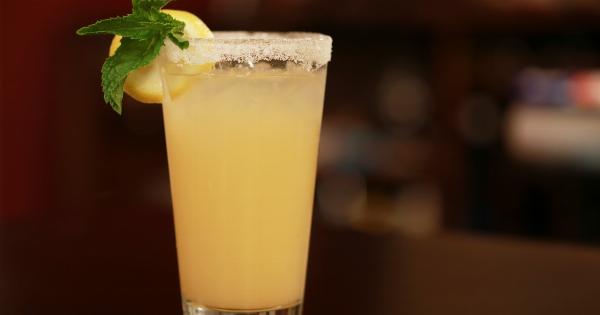We all experience cravings at some point in our lives. Sometimes, we crave something sweet, while at other times, we crave something salty. Many people often crave sugar after eating something that is salty.
This may seem strange, but it is a common occurrence. In this article, we will explore the reasons why you crave sweetness after eating something salty.
What is a Salt Craving?
A salt craving is a desire for salty foods that often results in a preference for high-sodium foods. The body needs salt to perform various functions, such as transmitting nerve impulses and contracting muscle fibers.
However, too much salt can have adverse effects on the body, such as increasing the risk of high blood pressure and stroke.
The body has a mechanism that regulates salt intake, and when it detects a sodium deficiency, it signals the brain to crave salty foods. This mechanism works in the opposite way too. When you consume too much salt, the body craves sweet or sugary foods.
What is a Sugar Craving?
A sugar craving is an intense desire for sweet foods. This can manifest in various ways, such as a craving for chocolate, candy, cakes, or sweet drinks such as soda and juices.
A sugar craving can occur due to several underlying reasons, such as stress, dehydration, or hormonal imbalances.
When you consume sugary foods, the body releases a hormone called insulin, which helps convert the sugar into energy. Too much sugar consumption can lead to insulin resistance, which increases the risk of type 2 diabetes.
What is the Relationship Between Salt and Sugar Cravings?
The relationship between salt and sugar cravings is complex. While the body has separate mechanisms that regulate salt and sugar intake, the two cravings are interrelated.
When you consume salty foods, the body loses water, and the blood becomes more concentrated. As a result, the kidneys produce less urine to conserve water.
The body then signals the brain to consume water, which can sometimes manifest as a craving for sweet drinks or foods. This is because sugar-sweetened drinks can help the body retain water and regulate electrolyte balance.
Furthermore, consuming sugary foods can reduce the intensity of salt cravings by providing a temporary fix for the body’s need for energy.
Eating sugary foods can increase dopamine, a neurotransmitter that regulates pleasure and reward in the brain. This can provide temporary relief from salt cravings.
Other Factors That Contribute to Salt and Sugar Cravings
Dehydration
Dehydration is a common reason for salt and sugar cravings. When the body is dehydrated, it tries to conserve water by producing less urine. This means that the urine is more concentrated, which can lead to salt cravings.
Drinking sugary drinks can also help the body hold onto water, which can temporarily relieve the symptoms of dehydration.
Stress
Stress can also contribute to salt and sugar cravings. When you are stressed, the body releases cortisol, a hormone that prepares the body for the fight or flight response. Cortisol also increases blood sugar levels, which can lead to sugar cravings.
Furthermore, stress can increase the production of aldosterone, a hormone that regulates sodium and potassium levels in the body. This can lead to salt cravings.
Hormonal Imbalances
Hormonal imbalances can also contribute to salt and sugar cravings. Hormones such as insulin, cortisol, and estrogen can affect blood sugar levels and electrolyte balance in the body.
For example, women may experience sugar cravings during their menstrual cycle due to hormonal fluctuations.
Medical Conditions
Medical conditions such as diabetes, hypothyroidism, and adrenal insufficiency can also contribute to salt and sugar cravings.
These conditions can affect insulin levels, electrolyte balance, and hormone production, which can cause salt and sugar cravings. If you have frequent salt and sugar cravings, it is essential to consult with a healthcare professional to rule out any underlying medical conditions.
Food Additives
Food additives such as monosodium glutamate (MSG) can also contribute to salt cravings. MSG is a flavor enhancer that is often added to processed foods to enhance their taste. MSG is known to stimulate the taste buds and trigger salt cravings.
Similarly, artificial sweeteners such as aspartame can also increase sugar cravings.
How to Curb Salt and Sugar Cravings
Curing salt and sugar cravings can be challenging, but there are several ways to manage them. Here are some tips:.
Stay Hydrated
Drinking plenty of water can help prevent dehydration and reduce salt and sugar cravings.
Eat a Balanced Diet
Eating a balanced diet that is rich in whole grains, lean protein, fruits, and vegetables can help regulate blood sugar and electrolyte balance in the body, reducing the risk of salt and sugar cravings.
Avoid Processed Foods
Avoiding processed foods that are high in salt, sugar, and additives can help reduce salt and sugar cravings.
Manage Stress
Managing stress through techniques such as meditation, yoga, or exercise can help reduce cortisol levels and prevent sugar cravings.
Seek Professional Help
If you have frequent salt and sugar cravings that affect your daily life, it is essential to seek professional help. A healthcare professional can help rule out any underlying medical conditions and provide personalized treatment options.
Conclusion
Cravings are a natural part of the body’s mechanisms to regulate salt and sugar intake. Consuming salty foods can lead to the body craving sugary foods to regulate electrolyte balance.
Several factors, such as dehydration, stress, hormonal imbalances, medical conditions, and food additives, can contribute to salt and sugar cravings. Managing salt and sugar cravings requires a balanced diet, hydration, stress management, and avoiding processed foods.























